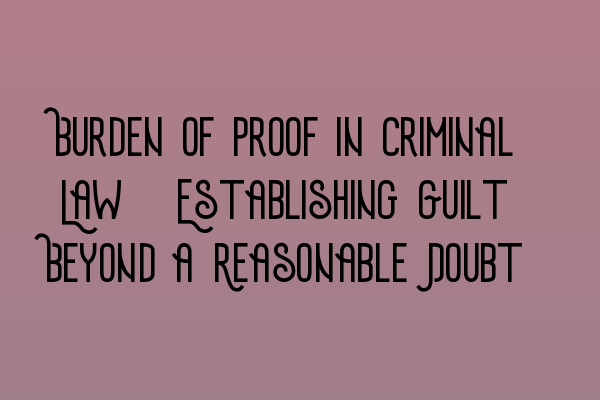Burden of Proof in Criminal Law: Establishing Guilt Beyond a Reasonable Doubt
In the realm of criminal law, the burden of proof is a fundamental principle that safeguards the rights of the accused and ensures a fair trial. The burden of proof lies with the prosecution, who must establish the guilt of the accused beyond a reasonable doubt. This high standard of proof is crucial to protect the presumption of innocence and prevent wrongful convictions.
The Principle of Presumption of Innocence
At the heart of the criminal justice system is the principle of presumption of innocence. This principle dictates that an individual is presumed innocent until proven guilty. It places the onus on the prosecution to present compelling evidence that demonstrates the guilt of the accused beyond a reasonable doubt.
The burden of proving guilt rests solely with the prosecution, as the defense does not need to present any evidence to establish innocence. This reflects the belief that it is the state’s responsibility to prove criminal liability, rather than the accused having to prove their innocence.
What Does “Beyond a Reasonable Doubt” Mean?
The phrase “beyond a reasonable doubt” is a legal standard that signifies the level of certainty needed to establish guilt in a criminal trial. It implies moral certainty based on the presented evidence, where there is no room for any reasonable doubt.
Reasonable doubt does not require absolute certainty or the elimination of all possible doubts. Rather, it refers to doubts that arise from the evidence or lack thereof presented by the prosecution. If there is a reasonable doubt in the minds of the jurors or judge, it is their duty to acquit the accused.
The Importance of Establishing Guilt Beyond a Reasonable Doubt
Establishing guilt beyond a reasonable doubt is crucial to protect the rights of the accused and ensure a just outcome. This high standard serves as a safeguard against wrongful convictions, protecting innocent individuals from being wrongly punished.
By requiring the prosecution to meet this high burden, the legal system minimizes the risk of convicting innocent individuals. It sets a standard of proof that demands the most convincing and compelling evidence to establish guilt.
Challenging the Prosecution’s Case
The defense has the opportunity to challenge the prosecution’s case and raise reasonable doubt through various means. This can include cross-examination of witnesses, presenting alternative explanations, highlighting inconsistencies in the evidence, or introducing alibi evidence.
The defense may also challenge the reliability or credibility of the prosecution’s evidence, such as eyewitness testimony, forensic evidence, or expert opinions. These challenges aim to introduce doubt into the case, thus undermining the prosecution’s attempt to establish guilt beyond a reasonable doubt.
Conclusion
The burden of proof in criminal law rests with the prosecution, requiring them to establish guilt beyond a reasonable doubt. This high standard protects the rights of the accused and ensures a fair trial. By requiring the most convincing and compelling evidence, the legal system minimizes the risk of wrongful convictions.
For further practice and preparation for the SQE exams, you may find the following articles helpful:
